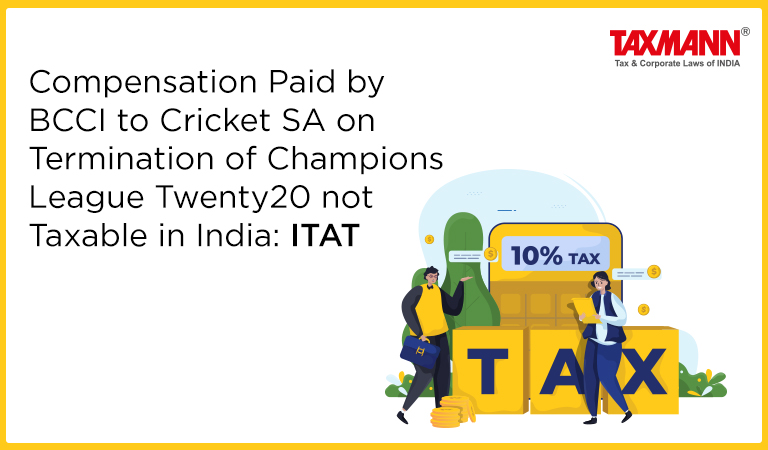Compensation Paid by BCCI to Cricket SA on Termination of Champions League Twenty20 not Taxable in India: ITAT
- News|Blog|International Tax|
- 2 Min Read
- By Taxmann
- |
- Last Updated on 15 May, 2023

Case details: Board of Control for Cricket in India v. Dy. Commissioner of Income Tax - [2023] 150 taxmann.com 246
Judiciary and Counsel Details
-
- G. S. Pannu, President and Sandeep Singh Karhail, Judicial Member.
- P.J. Pardiwala, Nitesh Joshi and Anil Sathe for the Appellant.
- Ms. Surabhi Sharma for the Respondent.
Facts of the Case
The assessee-BCCI was the national body for Cricket in India, and deriving substantial income from Cricket tournaments & matches. In 2008, the assessee commenced conducting a Cricket tournament, namely, the Champions League T20 (“CLT20”).
To maximise the commercial success of the CLT20, the assessee arrived at an arrangement with Cricket South Africa (“CSA”) that the assessee paid a quantified participation fee to CSA each year towards the participation of teams from its jurisdiction for the duration of the CLT20 term and deducted tax thereon. After a certain period, the agreement was discontinued, and BCCI made payment to the CSA on the termination of such agreement in the nature of non-compete fees.
Assessee filed an appeal under section 248 seeking a declaration that the tax was not required to be deducted from the amount it paid to the CSA. However, CIT(A) dismissed the appeal and held that said payment is taxable as ‘Income from business’ under section 28(va).
Aggrieved-assessee challenged the order of CIT(A) before the Mumbai Tribunal.
ITAT Held
The Tribunal held that as per the provision of the Explanation 1(a) to section 9(1)(i), only the portion of the income which is “reasonably attributable” to the operations carried out in India shall be deemed to accrue or arise in India for taxation.
In the present case, it was evident that the assessee and CSA agreed to cease in full all arrangements amongst them. Accordingly, CSA was not obligated to ensure the participation of any domestic team in the CLT20 Tournament. Further, it was not involved in directly or indirectly managing, operating, staging, involving itself and/or any teams from South Africa and/or otherwise participating in any tournament similar to CLT20 Tournament. Thus, in the year under consideration, no services were rendered by facilitating two domestic teams for participation in the CLT20 Tournament.
As regards the compensation being in the nature of non-compete fees, the non-compete clause would also apply outside India because if any tournament takes place in India, the same would be organised by the assessee, being the national body for cricket in India. CSA was not restrained from participating in such tournament, by virtue of the Termination Agreement.
Therefore, the payment to CSA was not arising from any operations carried out in India in the year under consideration. Thus the same was not taxable under section 9(1).
Disclaimer: The content/information published on the website is only for general information of the user and shall not be construed as legal advice. While the Taxmann has exercised reasonable efforts to ensure the veracity of information/content published, Taxmann shall be under no liability in any manner whatsoever for incorrect information, if any.

Taxmann Publications has a dedicated in-house Research & Editorial Team. This team consists of a team of Chartered Accountants, Company Secretaries, and Lawyers. This team works under the guidance and supervision of editor-in-chief Mr Rakesh Bhargava.
The Research and Editorial Team is responsible for developing reliable and accurate content for the readers. The team follows the six-sigma approach to achieve the benchmark of zero error in its publications and research platforms. The team ensures that the following publication guidelines are thoroughly followed while developing the content:
- The statutory material is obtained only from the authorized and reliable sources
- All the latest developments in the judicial and legislative fields are covered
- Prepare the analytical write-ups on current, controversial, and important issues to help the readers to understand the concept and its implications
- Every content published by Taxmann is complete, accurate and lucid
- All evidence-based statements are supported with proper reference to Section, Circular No., Notification No. or citations
- The golden rules of grammar, style and consistency are thoroughly followed
- Font and size that’s easy to read and remain consistent across all imprint and digital publications are applied



 CA | CS | CMA
CA | CS | CMA
